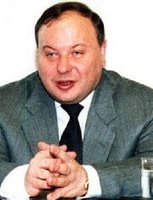Mixed Moscow

Fifteen years since Russia started its transition from a communist to a market economy the debate over what’s been done and where the country is heading is as intense as ever.
These days numerous economists and political leaders involved in this and other transition processes are assembling in Moscow for the 15th year anniversary of the Institute for Economies in Transition.
It is headed by Yegor Gaidar, who was the radically reforming Acting Prime Minister of Russia in 1991 and 1992. And it so happens that it coincides with his own 50th year birthday.
It’s been two days of intense debates on the different experiences of Armenia, Estonia, Poland, Kazakhstan, Serbia and – above all – Russia.
Much has certainly been achieved, but the tone of the debate is still dominated by worries for the future.
The curse of Russia’s economy is its oil and gas resources. Many are flowing at such rate as to make further reforms seem unnecessary, and after having achieved an impressive macroeconomic stabilisation it’s obvious that pressures are now building up for spending all the oil money on numerous things.
Inflation is picking up. Investments are clearly insufficient. And growth in Russia – while certainly robust at 5-6 % annually – is still below other reform economies and the potential that should be there.
More worrying are the obvious trends towards re-nationalisation of different resources. Already app a third of oil production has been taken back into state hands, and now other industries are also starting to feel the long arm of the Kremlin extending to get the power over their money.
It’s a vast money-grabbing exercise going on – obviously primarily to the benefit of the small elite that happens to be in control of the Russian state at the moment. Whenever Mr Putin leaves the Kremlin, it sounds unlikely that he will do it as a poor man.
And politics doesn’t look that much better.
Yesterday the office of Open Society Foundation was brutally closed down by the authorities. There is very little of organised civil society that remains after the rolling clamp-down of the last few months.
An important and virulently pro-Putin American economic analysts was the other day informed that because of national security concerns he will be banned from entering the country again. For all his pro-Putin writings, he has also been busy exposing some of the more shady deals done in his surroundings.
And television brings back memories from Milosevic’s days in Serbia. Programming is overtly nationalistic with obvious militaristic overtones as well.
But Russia is a land of contrast.
There is an amazing vitality among its entrepreneurs, impressive skills among its scientist and a refreshing and open debates among young people and students. And it’s really in the middle of that Russia that I’m spending my days here in Moscow.


<< Home